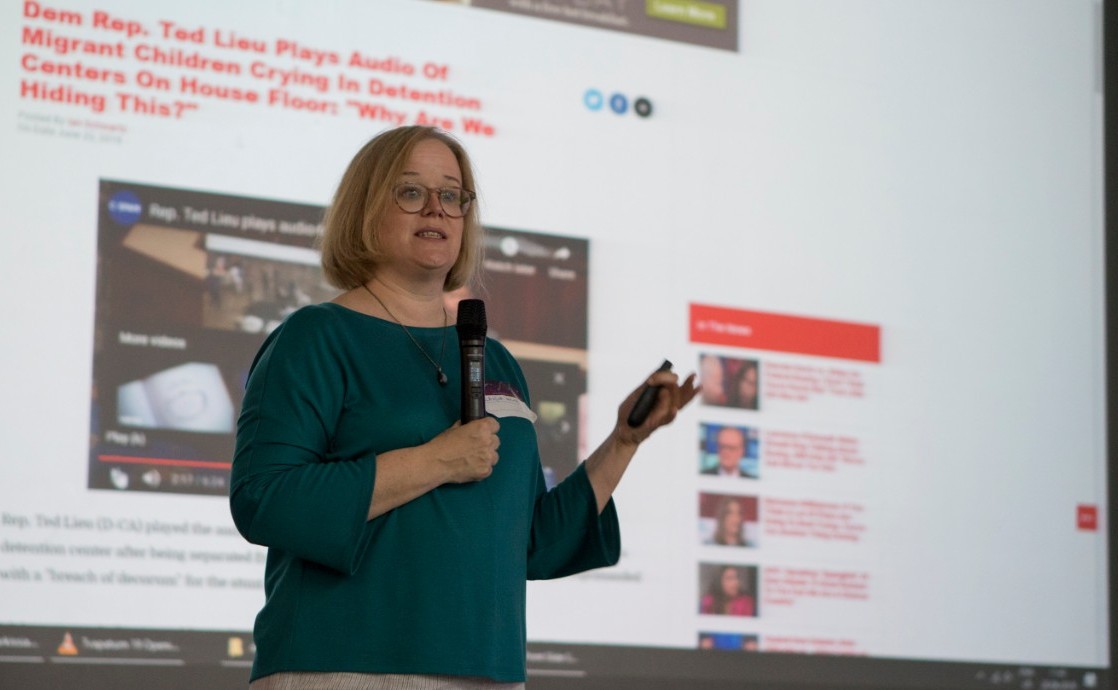
Claudia Milne is the senior video editor for the investigative platform, ProPublica. She considers working with the audience as the key to their work because honest and transparent relationships with the sources provide the impact of their media platform.
Today, all editors are aware of this, but not everyone is ready to invest in feedback, as often there is just not enough time.
Claudia Milne, who participated in the Tvapatum media conference, is confident that any media platform always benefits and gets results if it attracts the audience.
This result can be money in one case, reputation in another, or both of them together.
ProPublica has chosen ways to listen to people’s stories, analyze them from different perspectives, and to target the audience. For example, when preparing material about medical insurance and investigating cases of women’s deaths, the audience helped to complete and enrich the data.
The site has a section called “Help Us Investigate” and thanks to that section, journalists are able to understand topics that are of concern to people, hear their stories and investigate them. This was the case with immigration when the audience became involved in the investigation.
There are not many stories on ProPublica, but they are impressive and have a great deal of coverage. And the important thing is that the topics affect people’s lives. Meanwhile, the team of investigating journalists begins to look for new traces of the story.
Why should people get involved in your stories?
We do not always have enough of our own videos to make the subject interesting. It’s hence here that the audience’s attraction is important. We discuss the topic with them, explain the importance and benefits of their participation.
Sometimes people are so interested in the topic that it is difficult to coordinate working with them. We get a huge amount of information that needs to be sorted, checked and found ways to present the topic carefully and in the best possible way.
There must be a dialogue to succeed. And it’s not a theatrical dialogue when actors tell stories. The audience must unconditionally believe in the heroes of the investigation.
If the characters in journalism are not sincere and their way of presentation is like a theatrical presentation, then the story is doomed to failure.
Of course, finding honest narratives is not easy, people are often afraid to talk to the camera. On the other hand, not all characters can be perceived and accepted by the public.
Accepting that we do not need to play, we’re trying to make stories with exciting visual and audio tricks to personalize them. For example, in the story on immigrants, we emphasized the child’s excitement without mentioning their names or showing their faces.
People do not always present stories truthfully, concealing or adding some things. This is a form of self-defense. How can a journalist trust sources?
Journalists deal with risks every day. It makes our lives interesting and sometimes it requires ungrounded deformation.
The risk has different sides, but in our case, the risk is not in the justification of our work but rather, the protection of our heroes.
You know, there is no journalist who hasn’t made a mistake, become confused or been manipulated. The reason is the shortage of time. We have such a rule: The easier the sources communicate information, the more careful we have to be about their impartiality.
We sometimes spend a lot of time before publishing the story to check the information and check that it corresponds with reality.
We have an employee responsible for verifying the facts. Wasting time may seem luxurious, but what can you do? Special attention should be paid to sensitive topics.
In fact, for the journalist, the person and the conversations with them are expensive capital.
Communication with people requires time. A lot of time.
You need to understand whether you are ready for it or not. If you are ready, you need to figure out how to manage that time, because you cannot chat endlessly, get documents, data, check them, replenish them and compare them.
However, the more time you spend communicating with people, the better you understand the story, and the easier it is to build up the skeleton of the story, the core piece of the topic.
The journalist also gives time to invest in the story. People encourage journalists to deepen into the story, that is, they become a driving force. If journalists understand this, they will not waste their time. At the same time, this approach will bring quality to the field.
The journalist’s attempts to engage the audience increases the number of followers in the first place. And the stories, depending on the type, can reach out of the local context or vice versa, become more local and narrow.
How does the media become influential?
We do not want to just see people in front of the camera; we do not intimidate them or rush them. We either tell their anonymous stories, or we change their name we cover their faces we only leave their voices, etc. We cannot say a lot of things because we spend a lot of time on one story.
Creating a focus area is our biggest problem, and it further ensures our influence and reputation. Most often, heroes, who appear at the center of attention, receive public support and protection, compassion, professional advice, financial and other assistance.
That is beneficial for both sides as the topics are voiced and the aid structures and people help. We need to be a good mediator.
How are relief efforts organized after the stories are published?
After publishing the material, our work does not end. If there are people who want to help then you have to get permission from the heroes, in order for them to talk to them directly and describe the situation from all sides.
During these interactions, we try to have our representative, mainly a lawyer.
What do you do when the relations with sources start to cross the line?
It is important to be clear when working with sources. It needs to be explained to them that their relationship with the journalist needs to remain professional. The journalist cannot give promises. For example, a promise of money or a final solution to the problem.
People can become suspicious, skeptical, sensitive and cowardly. Either way, we are obliged to work with people honestly and transparently, without making any promises.
We only get the story and nothing else. It’s like a classical deal.
Interview by Gayane Asryan


Add new comment
Comments by Media.am readers become public after moderation. We urge our readers not to leave anonymous comments. It’s always nice to know with whom one is speaking.
We do not publish comments that contain profanities, non-normative lexicon, personal attacks or threats. We do not publish comments that spread hate.